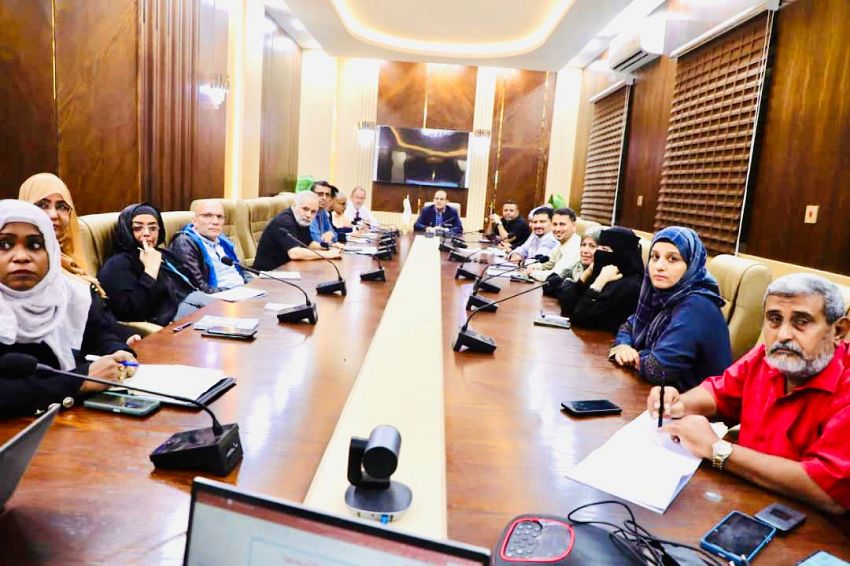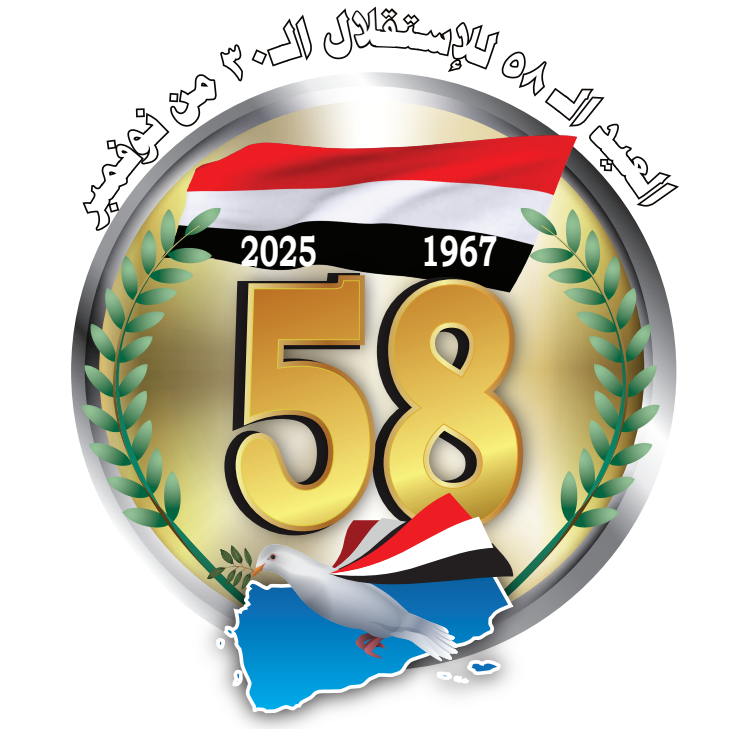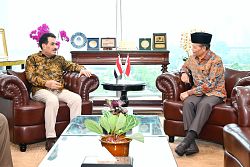
Yemen-Indonesia Discuss Parliamentary Ties
Yemen's Ambassador to Indonesia, Salem Belfqih, met with Deputy Speaker of Indonesia's House of Representatives, Dr. Mohammad Hedayat Wahid, to explore ways to boost bilateral cooperation, particularly in the parliamentary sphere.
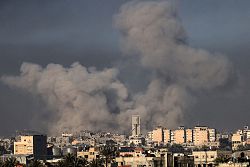
Casualty Toll from Israeli Offensive on Gaza Rises to 72,070 Martyrs, 171,738 Injured
The casualty toll from the Israeli occupation’s offensive on the Gaza Strip since October 7, 2023, has risen to 72,070 martyrs and 171,738 injured, according to the Ministry of Health in Gaza.

Korea large companies' exports rise 10 percent
Large companies' exports in South Korea rose approximately 10 percent year-on-year in the fourth quarter of last year, driven by increased global demand for semiconductors.
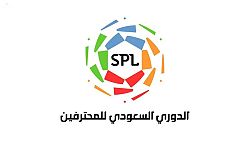
Saudi League: Al-Nassr, Al-Ettifaq and Neom Secure Victories Over Al-Ittihad, Damac and Al-Riyadh
Al-Nassr defeated its guest Al-Ittihad 2–0 in the match that brought them together at Al-Awwal Park Stadium in Riyadh, as part of the 21st round of the Saudi Professional League.
Last Update: ،
2026/02/23
Time
02:32:40
Latest News:
 Yemen-Syria Discuss Economic Cooperation
Yemen-Syria Discuss Economic Cooperation
 Yemen Supports Kuwait's Sovereignty Over its Maritime Areas and Elevations
Yemen Supports Kuwait's Sovereignty Over its Maritime Areas and Elevations
 Presidential Leadership Council Affirms Full Support for Government's Program, Praises Saudi Efforts ..
Presidential Leadership Council Affirms Full Support for Government's Program, Praises Saudi Efforts ..
 Minister of Transport sets priorities for current stage
Minister of Transport sets priorities for current stage
 Minister al-Bakri Discusses with UN Envoy’s Office Government Efforts to Strengthen Security, Stability
Minister al-Bakri Discusses with UN Envoy’s Office Government Efforts to Strengthen Security, Stability
Latest News:
 Yemen-Syria Discuss Economic Cooperation
Yemen-Syria Discuss Economic Cooperation
 Yemen Supports Kuwait's Sovereignty Over its Maritime Areas and Elevations
Yemen Supports Kuwait's Sovereignty Over its Maritime Areas and Elevations
 Presidential Leadership Council Affirms Full Support for Government's Program, Praises Saudi Efforts ..
Presidential Leadership Council Affirms Full Support for Government's Program, Praises Saudi Efforts ..
 Minister of Transport sets priorities for current stage
Minister of Transport sets priorities for current stage
 Minister al-Bakri Discusses with UN Envoy’s Office Government Efforts to Strengthen Security, Stability
Minister al-Bakri Discusses with UN Envoy’s Office Government Efforts to Strengthen Security, Stability
Health Minister holds meeting to address pandemic situation in Yemen
[08/04/2024 08:40]
ADEN-SABA
Minister of Public Health and Population Dr. Qasim Bhaybeh chaired Monday an extensive health meeting.
The meeting was dedicated to discussing the current pandemic situation, the spread map, and the range of measures and precautions taken by the ministry to confront the outbreak of acute watery diarrhea and cholera.
The meeting, which was attended by Dr. Ali al-Walidi the Deputy Minister of Health for Primary Health Care, directors of health offices in the liberated provinces, and health sector partners in international organizations, reviewed the epidemiological situation, suspected cases, and confirmed cases.
It also covered various interventions falling under the committee's purview, including surveillance, laboratories, infection control, water and environmental sanitation, monitoring and planning, vaccinations, logistical support, risk communication, and community engagement.
Minister Buhaybeh emphasized the importance of enhancing effective partnerships between the Ministry of Health and its partners in various international organizations, merging efforts to confront the spread of acute watery diarrhea and cholera, and finding appropriate solutions in the sectors working in this field.
He stressed the need to address the issue at both central and local levels and to share the burden centrally, locally, and with partners in relevant entities.
Furthermore, Minister Buhaybeh emphasized the importance of crystallizing ideas and visions presented in a unified action plan in coordination with health partners and formulating them into a comprehensive central and local action plan that is responsive and activates emergency rooms at the ministry and province levels.
He called on partners to increase their attention and coordination to respond effectively and prevent an increase in cases that threaten the health system, emphasizing the need for transparency, particularly in dealing with information related to the epidemiological situation in areas controlled by the Houthi militias.
For his part, Dr. Ali al-Walidi emphasized the importance of enhancing the work of various axes and activating coordination mechanisms with partners in relevant entities, prioritizing transparency in work, identifying the scale of the problem, and how to deal with it in areas controlled by the Houthi militias.
The meeting emphasized the need to activate organized collective work, intensify the awareness and educational message about the risks of acute watery diarrhea and cholera, and how to prevent them.
It urged the community to interact with awareness and guidance messages and apply them in reality, and to increase communication through various media outlets and identify target groups.
The meeting's outcomes also included a call to enhance the work of isolation centers and surveillance points, providing them with the necessary resources for their success, and preparing for two vaccination campaigns in the liberated governorates.
Minister of Public Health and Population Dr. Qasim Bhaybeh chaired Monday an extensive health meeting.
The meeting was dedicated to discussing the current pandemic situation, the spread map, and the range of measures and precautions taken by the ministry to confront the outbreak of acute watery diarrhea and cholera.
The meeting, which was attended by Dr. Ali al-Walidi the Deputy Minister of Health for Primary Health Care, directors of health offices in the liberated provinces, and health sector partners in international organizations, reviewed the epidemiological situation, suspected cases, and confirmed cases.
It also covered various interventions falling under the committee's purview, including surveillance, laboratories, infection control, water and environmental sanitation, monitoring and planning, vaccinations, logistical support, risk communication, and community engagement.
Minister Buhaybeh emphasized the importance of enhancing effective partnerships between the Ministry of Health and its partners in various international organizations, merging efforts to confront the spread of acute watery diarrhea and cholera, and finding appropriate solutions in the sectors working in this field.
He stressed the need to address the issue at both central and local levels and to share the burden centrally, locally, and with partners in relevant entities.
Furthermore, Minister Buhaybeh emphasized the importance of crystallizing ideas and visions presented in a unified action plan in coordination with health partners and formulating them into a comprehensive central and local action plan that is responsive and activates emergency rooms at the ministry and province levels.
He called on partners to increase their attention and coordination to respond effectively and prevent an increase in cases that threaten the health system, emphasizing the need for transparency, particularly in dealing with information related to the epidemiological situation in areas controlled by the Houthi militias.
For his part, Dr. Ali al-Walidi emphasized the importance of enhancing the work of various axes and activating coordination mechanisms with partners in relevant entities, prioritizing transparency in work, identifying the scale of the problem, and how to deal with it in areas controlled by the Houthi militias.
The meeting emphasized the need to activate organized collective work, intensify the awareness and educational message about the risks of acute watery diarrhea and cholera, and how to prevent them.
It urged the community to interact with awareness and guidance messages and apply them in reality, and to increase communication through various media outlets and identify target groups.
The meeting's outcomes also included a call to enhance the work of isolation centers and surveillance points, providing them with the necessary resources for their success, and preparing for two vaccination campaigns in the liberated governorates.
Key words:
epidemiological - Furthermore - SABA Minister - crystallizing - interventions - international - comprehensive - organizations - communication - environmental - Yemen-Syria Discuss Economic Cooperation
Yemen-Syria Discuss Economic Cooperation Yemen Supports Kuwait's Sovereignty Over its Maritime Areas and Elevations
Yemen Supports Kuwait's Sovereignty Over its Maritime Areas and Elevations Presidential Leadership Council Affirms Full Support for Government's Program, Praises Saudi Efforts
Presidential Leadership Council Affirms Full Support for Government's Program, Praises Saudi Efforts  Minister of Defense convenes meeting of his assistants, heads of military agencies
Minister of Defense convenes meeting of his assistants, heads of military agencies Yemen condemns statements of U.S. Ambassador to Israel
Yemen condemns statements of U.S. Ambassador to Israel Al-Wadiah Port Security foils attempt to smuggle thousands of Captagon pills
Al-Wadiah Port Security foils attempt to smuggle thousands of Captagon pills Yemeni Leadership Condemns Attempts to Disrupt State Institutions and Vows to Maintain Order
Yemeni Leadership Condemns Attempts to Disrupt State Institutions and Vows to Maintain Order Government Holds its First Meeting
Government Holds its First Meeting  Yemeni Ambassador Explores Ways to Boost Cultural Cooperation with Indonesian Minister
Yemeni Ambassador Explores Ways to Boost Cultural Cooperation with Indonesian Minister President al-Alimi: Restoring Sana’a and a Just, United Yemen Will Remain a Unifying National Goal
President al-Alimi: Restoring Sana’a and a Just, United Yemen Will Remain a Unifying National Goal